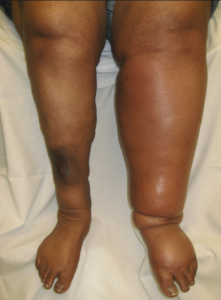Blastic plasmacytoid dendritic cell neoplasm (BPDCN): Tagraxofusp-erzs (Elzonris) FDA approved

Last Updated on December 30, 2018 by Joseph Gut – thasso

This may change now. On December 21, 2018, the American Food and Drug Administration (FDA) just approved Tagraxofusp-erzs (Elzonris) for the targeted treatment of BPDCN in adults and in pediatric patients, two years of age and older. Tagraxofusp-erzs is a interleukin-3 receptor (CD123) directed cytotoxin composed of recombinant human interleukin-3 (IL-3) and truncated diphtheria toxin (DT) fusion protein that inhibits protein synthesis and causes cell death in CD123- expressing cells.
Common side effects reported by patients in clinical trials were capillary leak syndrome (fluid and proteins leaking out of tiny blood vessels into surrounding tissues), nausea, fatigue, swelling of legs and hands (peripheral edema), fever (pyrexia), chills and weight increase. Most common laboratory abnormalities were decreases in lymphocytes, albumin, platelets, hemoglobin and calcium, and increases in glucose and liver enzymes (ALT and AST). Health care providers are advised to monitor liver enzyme levels and for signs of intolerance to the infusion. Women who are pregnant or breastfeeding should not take Tagraxofusp-erzs (Elzonris) because it may cause harm to a developing fetus or newborn baby. The labeling for Tagraxofusp-erzs (Elzonris) contains a Black boxed Warning to alert health care professionals and patients about the increased risk of capillary leak syndrome which may be life-threatening or fatal to patients in treatment.
In terms of patient safety, both physicians and patients need to exert extreme caution. Tagraxofusp-erzs (Elzonris) was approved based on clinical data obtained from a very minimal number of patients (28 patients from two cohorts only) and yet, the impressive collection of adverse effects, as indicate above, have been noted. And, most troublesome, one of the effects, namely capillary leak syndrome, can truly be life-threatening and fatal for affected patients.
If at any time you would like to know more about BPDCN, please follow this video:

